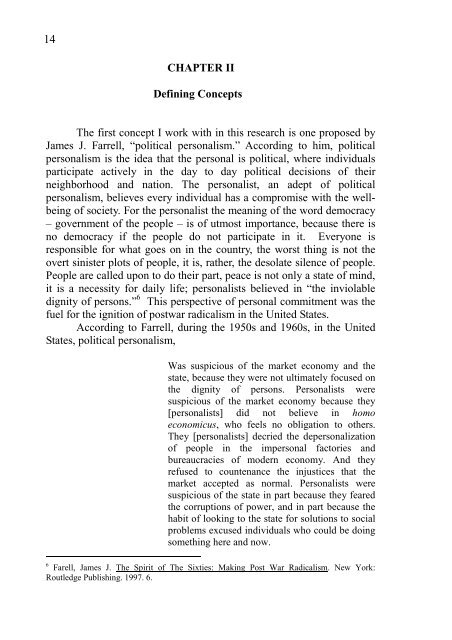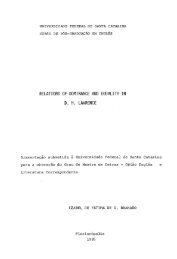Tropical ginsberg
Tropical ginsberg
Tropical ginsberg
Create successful ePaper yourself
Turn your PDF publications into a flip-book with our unique Google optimized e-Paper software.
14<br />
CHAPTER II<br />
Defining Concepts<br />
The first concept I work with in this research is one proposed by<br />
James J. Farrell, “political personalism.” According to him, political<br />
personalism is the idea that the personal is political, where individuals<br />
participate actively in the day to day political decisions of their<br />
neighborhood and nation. The personalist, an adept of political<br />
personalism, believes every individual has a compromise with the wellbeing<br />
of society. For the personalist the meaning of the word democracy<br />
– government of the people – is of utmost importance, because there is<br />
no democracy if the people do not participate in it. Everyone is<br />
responsible for what goes on in the country, the worst thing is not the<br />
overt sinister plots of people, it is, rather, the desolate silence of people.<br />
People are called upon to do their part, peace is not only a state of mind,<br />
it is a necessity for daily life; personalists believed in “the inviolable<br />
dignity of persons.” 6 This perspective of personal commitment was the<br />
fuel for the ignition of postwar radicalism in the United States.<br />
According to Farrell, during the 1950s and 1960s, in the United<br />
States, political personalism,<br />
Was suspicious of the market economy and the<br />
state, because they were not ultimately focused on<br />
the dignity of persons. Personalists were<br />
suspicious of the market economy because they<br />
[personalists] did not believe in homo<br />
economicus, who feels no obligation to others.<br />
They [personalists] decried the depersonalization<br />
of people in the impersonal factories and<br />
bureaucracies of modern economy. And they<br />
refused to countenance the injustices that the<br />
market accepted as normal. Personalists were<br />
suspicious of the state in part because they feared<br />
the corruptions of power, and in part because the<br />
habit of looking to the state for solutions to social<br />
problems excused individuals who could be doing<br />
something here and now.<br />
6 Farell, James J. The Spirit of The Sixties: Making Post War Radicalism. New York:<br />
Routledge Publishing. 1997. 6.

















